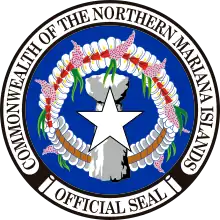Politics of the Northern Mariana Islands
Politics of the Northern Mariana Islands takes place in a framework of a presidential representative democratic system, whereby the Governor is head of government, and of a pluriform multi-party system. The Northern Mariana Islands are a commonwealth in political union with the United States. Executive power is exercised by the governor. Legislative power is vested in the two chambers of the legislature. The judiciary is independent of the executive and the legislature. Local government is carried out through three regional mayors.
 |
|---|
| This article is part of a series on the politics and government of the Northern Mariana Islands |
|
The Northern Mariana Islands and the United States of America reached a Covenant Agreement which became fully effective on November 4, 1986. The Constitution of the Commonwealth of the Northern Mariana Islands became effective on January 1, 1978.
Executive branch
| Office | Name | Party | Since |
|---|---|---|---|
| Governor | Ralph Torres | Republican Party | December 28, 2015 |
| Lieutenant Governor | Arnold Palacios [1] | Republican Party | January 14, 2019 |
Department Level Cabinet Positions
| Department | Head | Political Party | Tenure |
|---|---|---|---|
| Department of Finance | Secretary David DLG. Atalig[2][3] | ||
| Department of Community and Cultural Affairs | Secretary Robert Hunter[2] | ||
| Department of Labor | Secretary Vicky Benavente [2] | ||
| Department of Lands and Natural Resources | Secretary Anthony T. Benavente [2] | ||
| Department of Commerce | Secretary Mark O. Rabauliman [2] | ||
| Department of Corrections | Commissioner Ramon C. Mafnas [3] | ||
| Office of Planning and Development | Secretary James Ada[2] | Republican Party | |
| Department of Public Safety | Commissioner Robert A. Guerrero [2] | ||
| Office of the Attorney General | Attorney General Joey San Nicolas | 2012 | |
| Department of Public Lands | Secretary Marianne Concepcion-Teregeyo [2] | ||
| Office of the Public Defender | Public Defender Doug Hartig [2] |
Sub-cabinet level divisions and offices
| Office or division | Head | Political Party | Tenure |
|---|---|---|---|
| Administrative Office | Special Assistant for Administration Mathilda A. Rosario[2] | ||
| Public Information and Protocol Office | Press Secretary Kevin Bautista[2] | ||
| Liaison Office | |||
| Programs and Legislative Review Office | Special Assistant Victoria Guerrero |
Legislative branch
The Northern Mariana Islands Commonwealth Legislature has two chambers. The House of Representatives has 20 members, elected for a two-year term from seven districts. The Senate has 9 members, elected for a four-year term in two staggered classes.
Prior to January 2009, the Commonwealth maintained an elected "Resident Representative" in Washington, DC. As authorized by Pub.L. 110–229 (text) (pdf), the Commonwealth now elects a nonvoting delegate to the U.S. Congress (similar to other U.S. insular areas). The first election was held on November 4, 2008.
Political parties and elections
| Candidates and nominating parties | Votes | % |
|---|---|---|
| Benigno R. Fitial – Covenant Party | 3,809 | 28.1 |
| Heinz Hofschneider – Independent | 3,710 | 27.3 |
| Juan Babauta – Republican Party | 3,610 | 26.6 |
| Froilan Tenorio – Democratic Party | 2,442 | 18.0 |
| Total | 13,517 |
| Parties | Seats | |
|---|---|---|
| House | Senate | |
| Republican Party | 12 | — |
| Covenant Party | 4 | 1 |
| Independent | 3 | 2 |
| Democratic Party | 1 | — |
| Not up for election | — | 6 |
| Total | 20 | 9 |
| Source: Marianas Variety | ||
Judicial branch
Commonwealth Supreme Court; Superior Court; Federal District Court
Federal representation
In November 2008, the Northern Mariana Islands held its first election for a delegate to the United States Congress. Gregorio "Kilili" Sablan won the election, and began his term of office in January 2009.[4] The delegate serves as a member to some House committees and may vote in those committees, but the delegate is not permitted to vote on bills up for vote among all members of the House.
International organization participation
Political culture
Historically the Northern Mariana Islands have been subject to the colonizing powers of Spain, Germany, Japan, and the United States under a United Nations Trust Territory of the Pacific Islands Agreement. Each power contributed elements that mixed with local indigenous cultures to form the current political culture of the Northern Mariana Islands.
When United States citizenship was granted in 1986 to people who qualified as descendants of the Northern Marianas, few among the island's native population had been adequately prepared for democracy. As a result, politics in the Northern Mariana Islands is often "more a function of family relationships and personal loyalties" where the size of one's extended family is more important than a candidate's personal qualifications. Both scholarly works and the authors of the controversial website Saipansucks.com charge that this is nepotism carried out within the trappings of democracy.[5][6]
References
- "The Honorable Arnold I. Palacios". Office of the Governor of the Northern Mariana Islands. Retrieved 10 September 2020.
- "Current Cabinet". Office of the Governor of the Commonwealth of the Northern Mariana Islands. Retrieved 10 September 2020.
- "Executive Directory". Office of the Governor and Lieutenant Governor of the Commonwealth of the Northern Mariana Islands. 2013. Archived from the original on 23 May 2015. Retrieved 24 October 2013.
- Donato, Agnes E. (November 19, 2008). "Absentee votes confirm Kilili victory". Saipan Tribune. Archived from the original on February 14, 2012.
- http://worldcatlibraries.org/wcpa/oclc/58992651
- http://www.saipantribune.com/archives/newsstoryarch.aspx?cat=3&newsID=1594&archdte=3/30/1999%2012:00:00%20AM